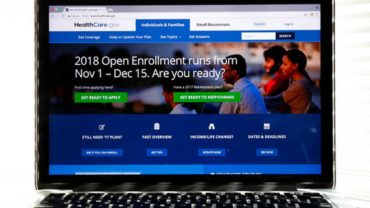Enrollment on the health insurance exchanges appeared to slow during Thanksgiving week in Georgia and nationally, federal figures show.
After 119,968 Georgians enrolled for 2018 coverage in the first three weeks of sign-ups, just 26,931 picked a health plan last week.

The pace of enrollment on the insurance exchanges was lower nationally as well, with 504,181 people selecting Obamacare plans on HealthCare.gov from Nov. 19 through Saturday, the fourth week of the open enrollment season, federal health officials said Wednesday.
That’s 294,648 fewer people than had selected a plan during the prior week, according to the federal Centers for Medicare and Medicaid Services.
So far this enrollment season, which began on the first day of November, 2.78 million people have chosen an individual health plan sold on the federally run exchanges. These exchanges serve the 39 states, including Georgia, that do not operate their own Obamacare marketplaces.
During roughly the same first four-week period last year, 2.14 million people signed up for a HealthCare.gov plan, said a CNBC report. But this year’s enrollment period, set to end Dec. 15, is much shorter than last year’s.
The 146,899 enrolling here so far placed Georgia as fourth-highest among the states listed, behind Florida, Texas and North Carolina.
About 404,000 began coverage in the exchange in Georgia this year, down from 2016, when 478,000 paid for a plan.
Separately, a Robert Wood Johnson Foundation report this week said that Georgia is one of the 15 most expensive states in terms of premiums for those individuals who don’t qualify for a subsidy (i.e., a discount) on the exchange.

“Georgia is in the expensive category,’’ said Katherine Hempstead of the RWJ Foundation. “The unsubsidized population confront the full retail price of health care.”
People with gross incomes between 138 percent and 400 percent of the federal poverty level qualify for subsidies to help pay their premiums. That means, for 2018 policies, an individual with a gross income below $48,240 (or a family of four whose income is less than $98,400) can get a subsidy.
Insurers in Georgia are raising exchange premiums up to 57 percent over this year’s levels, partly because the Trump administration halted cost-sharing reduction payments to the companies. For many exchange customers, that will mean more expensive coverage as the insurance companies pass along the increased costs.
On the other hand, many consumers who qualify for subsidies may find that prices are very reasonable. Though premiums in the state have spiked, that increase has led to higher subsidies, as required under the Affordable Care Act.

